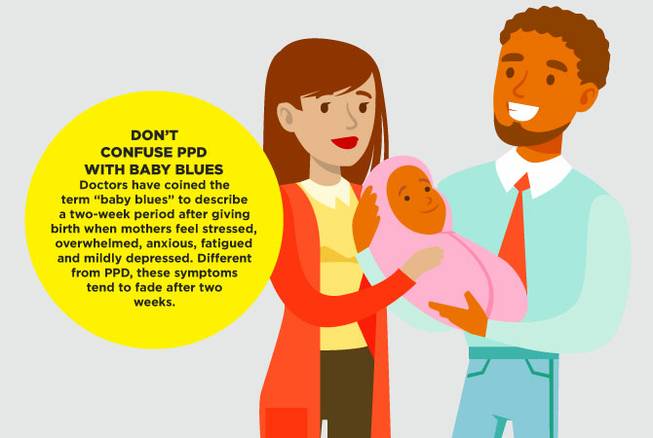
Monday, Jan. 30, 2017 | 2 a.m.
Many new mothers experience a variety of emotions after childbirth, but 1 in 7 experiences a serious mood disorder called postpartum depression (PPD).
“PPD occurs as a result of a rapid decrease in pregnancy hormones, such as estrogen and progesterone, in the postpartum period,” said Alexander Norton Jr., MD, OB-GYN at Spring Mountain Women’s Health and Southern Hills Hospital and Medical Center.
These hormonal changes can have a lasting effect on brain chemistry. Understanding PPD — its symptoms, causes and treatment options — is important for any new mother, father and loved ones.
How long will PPD last?
“PPD usually occurs within four weeks of delivery, but it also can appear within the first six weeks as well,” Norton said.
If PPD is left untreated, women can experience symptoms for up to a year after giving birth. The American Psychiatric Association (APA) reports that some women also may begin experiencing symptoms of depression during their pregnancy.
Don't confuse PPD with baby blues
Doctors have coined the term “baby blues” to describe a two-week period after giving birth when mothers feel stressed, overwhelmed, anxious, fatigued and mildly depressed. Different from PPD, these symptoms tend to fade after two weeks.
Symptoms
PPD is personal, and patients experience the condition differently. Symptoms include but are not limited to:
• Extreme mood swings
• Sudden fits of anger, sadness and/or irritability
• Feelings of excessive guilt, worthlessness and/or hopelessness
• Insomnia, fatigue or changes in sleep
• Changes in appetite; weight gain/loss
• Feelings of numbness/emptiness/being disconnected from the people around you
• Withdrawing from loved ones and/or activities you once enjoyed
• Anxiety
• Long stretches of uncontrollable crying, with or without an identifiable cause
• Fear of being a bad or incapable mother
• Thoughts of suicide or hurting the baby (occurs in very extreme cases of PPD — patients should seek immediate help if these thoughts begin to arise)
How is PPD diagnosed and treated?
“To diagnose PPD, doctors and hospitals use the Edinburgh Postnatal Depression Scale as a way to detect signs of depression. It’s a questionnaire that patients fill out,” Norton said.
Diagnosis can be as simple as asking for help, but women need to be open and honest about any symptoms they’re experiencing.
Although feelings of guilt and shame are common with PPD, it’s important to remember that PPD is a medical condition. Women need to know that none of the feelings they’re having as a result of PPD make them bad mothers, and they should not hesitate to disclose those feelings to their doctor.
PPD is treatable and can be effectively managed through therapy, counseling and/or medication.
Risk factors
There are several risk factors associated with PPD. However, having risk factors does not guarantee instances of PPD, nor do they lessen a woman’s chances of getting PPD without having risk factors. In fact, the APA reports that half of all women diagnosed with PPD will not have had any prior experience with depression.
Women concerned about PPD should talk to their doctor and mention any risk factors, which include:
• Previous experience with depression and/or anxiety
• Family history of mental illness
• Stressful life events during or after pregnancy
• Traumatic birth experience
• Poor social or familial support
• Having a baby with special needs or medical complications
• Having a challenging baby, such as a baby with colic and/or issues with nursing
It's important to talk about PPD
While PPD awareness continues to grow, it is a complicated condition that often can go unrecognized because of societal stigmas, undue feelings of guilt and uncertainty about the diagnosis itself.
“In the past, PPD was poorly understood and ignorance prevailed. We live in a complex society, but PPD is a serious problem that can have devastating effects on women, infants and families if untreated,” Norton said. Any new mothers, fathers and loved ones should have an open and accepting understanding of PPD and get help if any symptoms present.
Find a support group
In addition to clinical treatment, many women find relief through support groups with other PPD patients. Support groups can be recommended by your doctor or therapist, found online or offered through your local hospital. If you or someone you love is experiencing severe symptoms with thoughts of suicide or infanticide, call 911 immediately or go to the nearest emergency room. The National Suicide Lifeline is also a valuable resource and can be reached at 1-800-273-TALK.

Join the Discussion:
Check this out for a full explanation of our conversion to the LiveFyre commenting system and instructions on how to sign up for an account.
Full comments policy